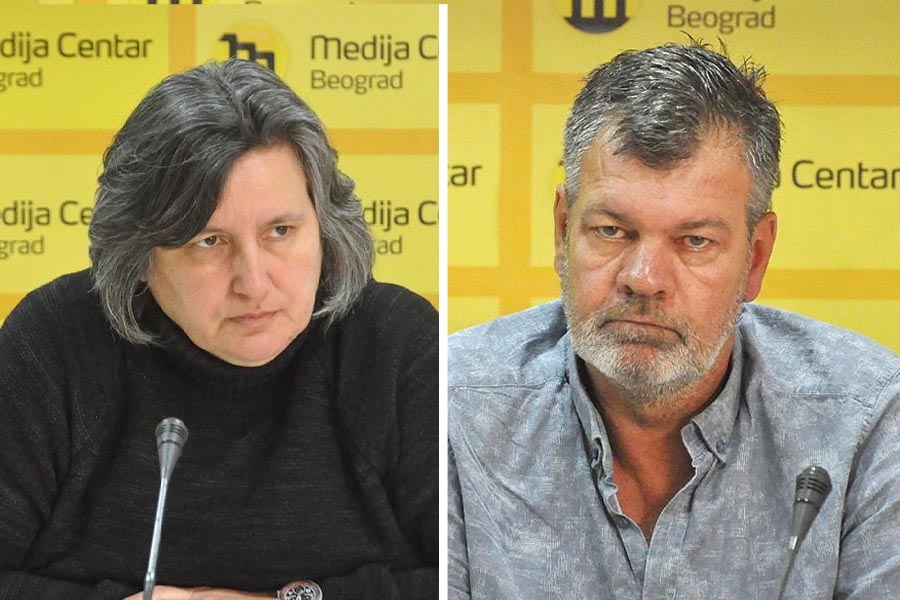How much do we know about the term "just transition," where Serbia stands regarding the green transition, what to expect, what influence unions have on decision-making, and what union representatives place in politics?
In an interview for Demostat, representatives of Serbian unions state that the green transition will reshape the labor market by opening up new possibilities but also new risks, creating new jobs while extinguishing existing ones. It is crucial, they emphasize, that, above all countries, care is taken to ensure that no one comes out of it as a victim.
Although the transformation towards a green economy in Serbia is slow and cautious, the president of UGS Nezavisnost, Cedanka Andric, reminds us that there is "no turning back," and that is why a clear transition plan is needed, one that will be fair to all citizens who may be affected in any way.
The Vice President of the Confederation of Autonomous Trade Unions of Serbia, Dusko Vukovic, says that considering the decades-long political, economic, and social environment dominated by partisan and personal interests, with decreasing dialogue, a bright future regarding the transition cannot be expected.
Regarding union involvement in politics, Andric states that UGS Nezavisnost is not fighting for power, is not a political party or a wing of any political party, and the dominant stance is that it should remain so. Vukovic notes that members of SSSS have diverse political views and preferences, but it would not be suitable for that union organization to engage in politics directly.

How much do we know about the term "just transition," where Serbia stands regarding the green transition, what to expect, what influence unions have on decision-making, and what union representatives place in politics?
In an interview for Demostat, representatives of Serbian unions state that the green transition will reshape the labor market by opening up new possibilities but also new risks, creating new jobs while extinguishing existing ones. It is crucial, they emphasize, that, above all countries, care is taken to ensure that no one comes out of it as a victim.
Although the transformation towards a green economy in Serbia is slow and cautious, the president of UGS Nezavisnost, Cedanka Andric, reminds us that there is "no turning back," and that is why a clear transition plan is needed, one that will be fair to all citizens who may be affected in any way.
The Vice President of the Confederation of Autonomous Trade Unions of Serbia, Dusko Vukovic, says that considering the decades-long political, economic, and social environment dominated by partisan and personal interests, with decreasing dialogue, a bright future regarding the transition cannot be expected.
Regarding union involvement in politics, Andric states that UGS Nezavisnost is not fighting for power, is not a political party or a wing of any political party, and the dominant stance is that it should remain so. Vukovic notes that members of SSSS have diverse political views and preferences, but it would not be suitable for that union organization to engage in politics directly.

The environment has paid a high price for industrial development; it is time to reduce dependence on fossil fuels and transition towards a green, sustainable economy.
This transition must be fair, primarily towards workers, local populations, and all citizens who may be affected by the industrial transformation. Serbia has committed to contributing to the global reduction of greenhouse gas emissions and following the European Unions green agenda to make the European continent climate-neutral by 2050.
A just transition involves fundamental changes in key economic sectors and consumer systems like energy, transportation, agriculture, food, infrastructure, social values, and politics. It requires a global shift towards a humane and fair economic system with a healthy ecosystem, healthcare, public services, education, and culture.
How do union representatives see this issue in 2024? Can we expect a just transition in Serbia, given the memories of the previous one that left so many transition losers? Where do unions fit into all of this, and what influences decision-making? How much are unions involved in policies versus politics in Serbia?
Aware that the green transition will reshape the job market, creating new opportunities and risks, as well as the need for new skills and knowledge, the president of the United Branch Trade Union Nezavisnost, Cedanka Andric, states for Demostat that it is essential for the state and the private sector to provide resources for the transition. She emphasizes the need for workers not to see this transitional period as uncertain and stresses the importance of retraining and upskilling.
For her union, "just transition" means no one becomes its victim. She points out that many jobs in the so-called dirty industry, based on fossil fuels, are secure jobs with indefinite contracts and collective agreements.
"We are asking the same for new jobs in the green economy," she emphasizes, adding that the transition must involve dialogue with local communities, labor associations, non-governmental sectors, and the economy.
Highlighting that workers are most afraid of uncertainty, Andric states that it is very important to know the plans regarding this matter so that no one feels left out in the process and becomes a victim of the transition.
"The previous transition left many transition losers, and people are afraid of that," she emphasizes, adding that it is a mistake for the state not to discuss this more.
She mentions that the green transition process has started in Serbia, but it is slow, cautious, and with limited funds, especially from the EU.
"Nothing will happen overnight, especially in a country with an unstable economy and a modest budget. Our energy system is still dependent on coal, which is the first to be affected. The state must take care of energy security; we cannot simply be without a crucial energy source. We must have infrastructure," she states.
However, she emphasizes that Serbia has embarked on the path to a green economy, and there is no turning back.
"We border Bulgaria and Romania, EU countries. We have signed documents, committed ourselves to the Sofia Declaration on the Green Agenda for the Western Balkans, and joined the narrative of a climate-neutral Europe by 2050. We have obligations, and if we fail to meet them, we will pay fines for polluting other EU member countries. It is better to invest in infrastructure than to pay fines."
The first to be affected by the green transition in Serbia will be mining and coal-fired power plants, she notes. However, she adds that this path is very long, and preparations for alternatives must start long before the closure or modification of a mine is announced.
"These are professions ranging from engineers and technicians to miners, and the right alternative must be found for all these people when the transition occurs."
Stating that unions deal with various types of policies - from employment policies to healthcare, tax, and municipal policies - Cedanka Andric emphasizes that the Nezavisnost union is not involved with parties but must deal with policies.
Andric underscores that the Nezavisnost Union is not fighting for power, is not a political party, and is not affiliated with any political party. Union members may be in various political parties, which is their constitutional right. Still, the statute specifies that someone cannot simultaneously hold a position in the union and in a political party.
"We researched how to position ourselves in election campaigns, what the union should do, and the majority of members believed that we should not merge with any party, should not directly support a particular political party, nor should we have our list for elections," she says.
The dominant stance is, as she says, that the union should highlight specific elements it advocates for and monitor parties close to it.
"We should provide initiatives, express our opinions, and test every government to see how willing they are to listen to us and consider our views. You can be respected best if you present arguments rather than complain," she concludes.
Speaking about unions in politics, the Vice President of the Confederation of Autonomous Trade Unions of Serbia, Dusko Vukovic, says that his union members have diverse political views and sympathies. Some are even members of certain political blocs. However, he believes that directly involving unions in politics would not be beneficial. He emphasizes that historically, there is no deep connection between unions and a political party that, for example, originated from the union or had a profound connection with the union.
"At this moment, we are not considering turning to any political option, among other reasons, because someone might think that someone would abandon union interests to enter politics for personal reasons."
He states that the Confederation of Autonomous Trade Unions of Serbia (SSSS) has no collaboration with any political option, neither with the opposition nor with the authorities. However, he believes that other options in power, which "are not as conservative and populist," would have better relations with unions than the current ones.
Regarding the green transition, Vukovic says that a bright future cannot be expected considering the political, economic, and social environment dominated by party and partisan interests in Serbia over the decades.
He suggests that the green transition should include the majority of citizens in a socially acceptable and fair manner. It should not create a system where the interests of global capital continue to dominate, reducing workers and social rights and limiting opportunities for participation in any dialogue.
A just transition would involve the participation of all segments of society in making key economic, political, and social decisions in creating policies that will enable a safer, healthier, fairer, and more just life.
He points out that, based on experience, this cannot be expected in Serbia because the space for dialogue in the country has been decreasing for years. There is a lack of culture in political and social dialogue, and the space for expressing ones opinion has narrowed.
Vukovic also sees no significant progress in the green transition and adds that there is no clear vision on how to achieve it in Serbia.
"As a society, our primary goal within the green transition should be that no one working in dirty industries should be left without a job or perspective. Then, we must work strategically and meticulously on retraining, upskilling, and enabling the transfer of some employees to other areas so that everyone can achieve their interests – capitalists for profit and workers for wages. We should view the green transition not as resistance and a threat but as a just transition that will give us the opportunity to live dignified lives."
Vukovic states that it is part of the unions job to present the workers perspectives and views through certain institutions, especially the Institute of the Social and Economic Council, through negotiations. However, political elites, lobbyists, and big capitalists do not believe that every decision should be considered from all angles.
"They do not want unions as part of those who will participate in making certain policies with them, and thats why they make decisions without considering the interests of those who represent the minority. It is a complete absence of cultural dialogue and the idea that, through the decision-making process, you hear from those in a position to call them a minority or a weaker partner."
He reminds us that unions are weaker partners because they lack political power and capital. Still, they represent people who create new values and GDP, so their opinions should be respected.
In all societies there are issues that are rather being skipped. Certain...
The neoliberal path, started in 2001, has led to especially bad results in Serbi...
For centuries, the region was subsumed within the Ottoman and Hungarian Empires,...
"Serbia has returned to the systemic and anti-systemic position of the political...
In reality, Serbia is closer than ever to NATO. In the course of the last five y...